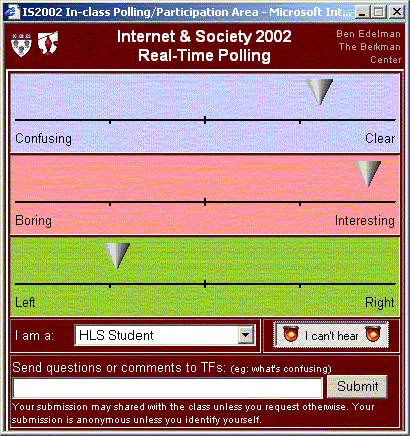The South China Morning Post published my assessment of China blocking Blogspot.
Large-Scale Registration of Domains with Typographical Errors
Large-Scale Registration of Domains with Typographical Errors. (January 2003)
The author reports more than eight thousand domains that consist of minor variations on the addresses of well-known web sites, reflecting typographical errors often made by Internet users manually typing these addresses into their web browsers. Although the majority of these domain names are variations of sites frequently used by children, and although their domain names do not suggest the presence of sexually-explicit content, more than 90% offer extensive sexually-explicit content. In addition, these domains are presented in a way that temporarily disables a browser’s Back and Exit commands, preventing users from exiting easily. Most or all of the domains are registered to an individual previously enjoined by the FTC from operating domains that are typographic variations on famous names, and these domains remain operational subsequent to an injunction ordering their suspension.
Defensive Registrations: Why They’re Still Needed, and How to Make Them Earn Their Keep
Invalid WHOIS Data: Who Is Responsible?
Invalid WHOIS Data: Who Is Responsible? CircleID. (November 2002)
Empirical Analysis of Internet Filtering in China with Jonathan Zittrain
Empirical Analysis of Internet Filtering in China – full article.
The authors are collecting data on the methods, scope, and depth of selective barriers to Internet access through Chinese networks. Tests from May 2002 through November 2002 indicate at least four distinct and independently operable methods of Internet filtering, with a documentable leap in filtering sophistication beginning in September 2002. The authors document thousands of sites rendered inaccessible using the most common and longstanding filtering practice. These sites were found through connections to the Internet by telephone dial-up link and through proxy servers in China. Once so connected, the authors attempted to access approximately two hundred thousand web sites. The authors tracked 19,032 web sites that were inaccessible from China on multiple occasions while remaining accessible from the United States. Such sites contained information about news, politics, health, commerce, and entertainment. See highlights of blocked pages. The authors conclude (1) that the Chinese government maintains an active interest in preventing users from viewing certain web content, both sexually explicit and non-sexually explicit; (2) that it has managed to configure overlapping nationwide systems to effectively — if at times irregularly — block such content from users who do not regularly seek to circumvent such blocking; and (3) that such blocking systems are becoming more refined even as they are likely more labor- and technology-intensive to maintain than cruder predecessors.
Revised and published as Internet Filtering in China (IEEE Internet Computing 2003).
Localized Google search result exclusions: Statement of issues and call for data with Jonathan Zittrain
The authors are studying exclusions from search engine search results, and have found some 113 sites excluded, in whole or in part, from the French google.fr and German google.de compared with google.com. Learn more about the situation and context, test the exclusions for yourself, and submit further sites suspected to be excluded. Full article.
TLD Registration Enforcement: A Call for Automation
TLD Registration Enforcement: A Call for Automation – Part I and Part II. CircleID. (September – October 2002)
Replacement of Google with Alternative Search Systems in China: Documentation and Screen Shots with Jonathan Zittrain
The authors are studying Internet filtering in countries worldwide, and current investigations focus on restrictions on web access in China. Using a web-based system to test web filtering in China, the authors previously determined and confirmed that Google was inaccessible from at least one testing location in China; initially, in testing beginning August 29, a request for Google led to the error “host not found,” consistent with requests for other inaccessible or blocked sites. However, using related methods, the authors have now confirmed and documented reports that Chinese Internet access currently provides pages other than the ordinary Google home page in response to requests for google.com; such behavior is believed to have begun on September 8. The screen shots in this article document six instances of this replacement. Full article.
Real-Time Polling System

The Real-Time Polling System is allows students and other meeting participants to express comments immediately viewed by the instructor or, optionally, the entire class. In one application, the system might present a slider with extremes labeled “I am confused” and “I understand”; when sufficiently many students move their sliders sufficiently towards the “confused” end of the spectrum, the instructor might be automatically alerted to pause for review or questions from students. The system can also be configured with buttons, checkboxes, drop-down lists, and free-response text boxes, and it can perform crosstab analysis, automatically reporting results split according to relevant demographic or other characteristics. Results are ordinarily displayed on a projection screen at the front of the room and/or on administrative consoles. Textual responses are integrated with the Participant Response Display Mechanism.
Details in Berkman Center Meeting Tools.
iCravetv.biz and Entervision Retransmit CNN, Cartoon Network, PAX TV, California NBC Affiliate
I found that iCravetv.biz and Entervision retransmitted CNN, Cartoon Network, PAX TV, and a California NBC Affiliate — an urgent concern in light of contemporaneous disputes about video retransmission. Details and screenshots.